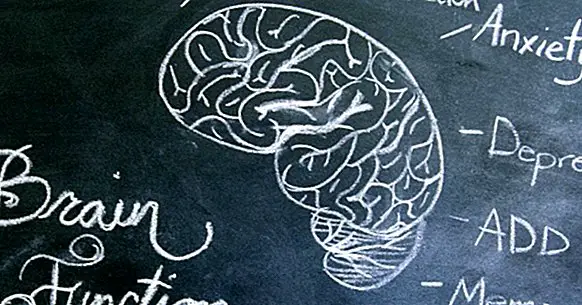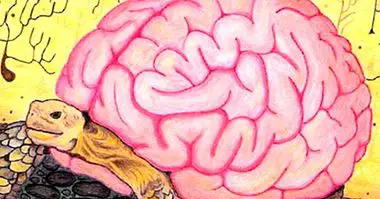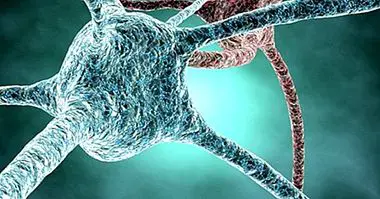13 games and strategies to exercise the mind
The mind. This concept, whose meaning and exact functioning are still today the subject of speculation and debate both scientifically and philosophically, refers to the set of cognitive abilities available to a subject .
This set of skills is what allows us, among other things, to have our own identity, solve simple or complex problems, detect and process different information and adapt to the environment.
But nevertheless, these abilities are not stable from birth to death . For this reason it is of great importance to contribute to develop them as much as possible. Therefore, this article is dedicated to visualize a series of strategies and games to exercise the mind.
A question of cerebral plasticity
As we have said, intellectual abilities are not an invariable element throughout life, but are modified according to our life experiences, the environment that surrounds us and the level of environmental stimulation to which we have access.
This modification is mainly due to the cerebral plasticity , the capacity of the brain when changing its structure according to the needs of the organism and its operating pattern, allowing the restructuring of the thinking organ through the creation of neuronal synapses. It is this creation of new neural networks and strengthening of old ones that allows learning and consolidating new knowledge, allowing from acquiring a new skill to overcome and recover normal functioning after a brain injury.
Although the plasticity is much greater during the growth stages such as childhood and later decays, it is a property that still exists in all ages, being especially important to maintain it and apply it in the later stages of life in order to maintain the well-being and the correct functioning of the intellectual capacities.
Neurogenesis: the ability to renew neurons
However, in order to produce neurogenesis (the birth of new neurons) and / or a strengthening or expansion of synaptic or neural networks, it is not enough to perform a specific exercise on one occasion, but rather the modification of one's own abilities and Behaviors require a habitual practice that allows the automation of new sequences of behavior and strategies, incorporating our usual repertoire.
In other words, regular practice is necessary in order to improve or maintain our mental abilities , accompanying all this with a proper diet and a healthy lifestyle. And, of course, an excellent way to make the networks of neurons that populate our brain flexible and easily adaptable to the new challenges of everyday life is to use games to exercise the mind: these will cause our brain to get used to creating a network of interconnections rich and very varied, which will allow us to have a greater mental flexibility.
Thirteen games to exercise the mind
Let's see below a series of games to exercise the mind.
1. Mathematical training
The use of mathematics as a strategy to exercise the mind is known to many , including activities such as sudoku and other traditional games. However, this time the game is based on choosing a completely random number (for example 12.345) and from other numbers (for example 6, 7, 8 and 9) develop a series of mathematical strategies in order to reach the initial number For this, sums, subtractions, multiplications, divisions can be used ... It can be complicated by requiring the use of concrete elements, such as, for example, the use of square roots or more complex elements.
2. Find the couples
Another game to exercise the mind, especially the visuospatial memory, is the game of card pairs . It is based on deploying on a table or flat surface a set of equal pairs of cards after shuffling them (the type of deck or even of images in case of having them is indifferent although it is recommended to use easy to remember images). The game is to visualize the set of cards face up, visualizing the location of each pair of cards after ten seconds of memorization to turn them all over.
Then you have to turn over one of the cards and then remember where your partner was located and also turn around. The game continues until all pairs of cards are found. This strategy for exercising the mind can be made difficult by making the images to be remembered or recognized more complex, or by increasing the number of cards as the game ends and starting again.
3. Word list
On this occasion we intend to train the memory by adding a creation component . The game or strategy consists in the initial creation of a list of simple words, of at most seven items. This list will be read by all participants, being able to be read aloud by one of them or you can let each participant have ten seconds to memorize it. The game in question consists in that each participant will proceed to repeat the list of words in the same order in which they were issued in the list, adding at the end of it one more word of his own harvest.
The next individual has to remember and say the list aloud plus the word added by the previous one and in turn add another one, and so on. The strategy to exercise the mind is based on the retention of information, with a component of distraction to have to imagine a word more and need to pay attention to incorporate the new words. Specifically, work memory is exercised, especially the auditory memory .
4. Find your symbol
This game to exercise memory is based on the sustained maintenance of attention . It can be used with symbols, words, letters or numbers. To carry it out simply has to use a varied set of symbols and signs, in which to look carefully one or several specific items. Technically, the operation is almost identical to that of classical letter soup. In addition to attention, in this game you can observe the processing speed of the subjects, if you measure the time they take to complete the task.
5. Play of words: association of words
This game requires several participants. In it, the first of the subjects says a word, the next participant having to respond to another one which starts with the same syllable as the one ending with the one said by the previous individual. It can be complicated by adding rules such as the fact that they belong to the same lexical family or thematic area, or even trying to give the whole the form of a story. It improves processing speed and mental agility, as well as creativity .
- Related article: "14 keys to enhance your creativity"
6. Find the differences
In order to reinforce concentration, ability to discriminate stimuli and focus on details, the game of finding differences is very useful to exercise the mind. Its operation is based on the location of a certain number of differences between two apparently identical images.
7. Puzzles and the like
The realization of a game or activity as known as a puzzle is also a more than valid strategy to exercise the mind. Specifically, It serves to exercise manipulative and visuospatial skills , when having to operate with the situation of the pieces and place them correctly so that the pieces fit together. To increase complexity you can increase the number of pieces needed, or move to three-dimensional puzzles such as Rubik's cubes.
8. Elaboration of a story
This strategy for the exercise of the mind is simple but very useful. Try to stimulate creativity from the development of a brief history , in which a series of specific words chosen in advance have to appear. These words may be known by the person who performs the exercise or may be unknown, in which case the challenge is greater whether it does not resort to external aid (a dictionary for example) or if it does, allowing the development of strategies for compensate for difficulties.
9. Riddles and dilemmas
This type of strategy to exercise the mind is grateful and enjoyable for both adults and children. It is based on solving riddles and dilemmas based on the logic and creativity of the participants. Lateral thinking is also stimulated If you use issues that do not have a simple solution or that is entirely correct or incorrect, trying to generate new strategies.
10. Discussion
Although it may not seem so, the debate is one of the best games to exercise the mind. Participating in one on a regular basis allows you to train in argumentation and creation of coherent discourses . For example, it forces us to think about the best replicas of the opponent's arguments, to prioritize some of our own arguments about others, to detect fallacies in the explanations of the other and to avoid them in us, etc.
11. Chess
Chess is the game paradigm in which the forecast of possible future scenarios is of fundamental importance. It is a game in which you have to follow very specific rules, which causes chance to lose prominence, and that is why we must try to think of a series of possible movements of both the opponent and ourselves.
12. Exquisite corpse
A group game in which each person, in turn, makes the part of a drawing from what the person from the previous shift has drawn . It can also be done by writing parts of a story instead of drawing. An excellent way to work creativity.
13. Memory count
This game is very simple and can also be done almost anywhere.When you stress in an area where there are a lot of objects or people, close your eyes and try to count by heart the amount of some of those elements.
Bibliographic references:
- Kolb, B .; Mohamed, A. & Gibb, R. (2010), The search for the factors that underlie brain plasticity in the normal and damaged brain. Journal of Communication Disorders.
- Maroto, M.A. (2003). Memory, program of stimulation and cognitive maintenance for elderly people. Institute of Public Health. Madrid.
- Martí, P .; Mercadal, M .; Cardona, J .; Ruiz, I .; Sagristá, M. and Mañós, Q. (2004). Non-pharmacological intervention in dementia and Alzheimer's disease: miscellaneous. In J, Deví., J, Deus, Dementias and Alzheimer's disease: a practical and interdisciplinary approach (559-587). Barcelona: Higher Institute of Psychological Studies.



















